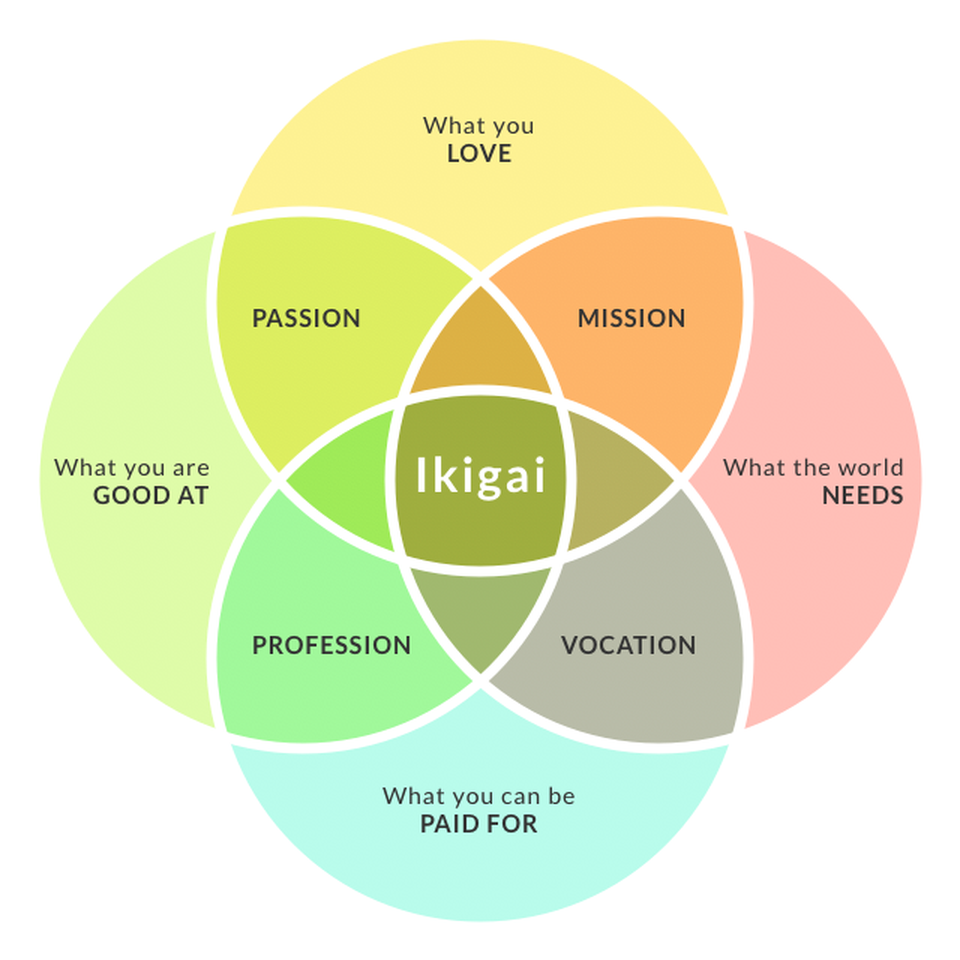I was surprised when I see that some people like my father or uncle are tired from their life and work at the age of sixty and at the same time and in the same world a person like our Honorable Prime Minister Narendra Modi and Honorable President Ramnath Kovind whose age is 67 years and 74 years respectively can work tremendously. Why such a huge gap between the same people? Both are human then also one is frustrated with his life and other can see new dreams.
But, I got my answer when I came to know about the Japanese concept to live a long and happy life.
We all know that we are habituated to compromise with our lives and adjust it to situations. We never fight to get that which we want from life and that's the border which divides persons like Narendra Modi, Ramnath Kovind, Narayan Murty, Manmohan Sing, Bill Gates, Kapil Dev, Amitabh Bachchan and persons like mine and maybe most of your fathers.
Let we see how this concept of 'Ikigai' divides us from them.
- What is IKIGAI?
Like the Danish word hygge, there’s no simple, direct translation into English for the Japanese word ikigai. It roughly means the “thing that you live for” or “the reason for which you get up in the morning.” In a nutshell, it encompasses the idea that happiness in life is about more than money or a fancy job title. (Courtesy: Melody Wilding)
In a simple way, you can understand from this Image.

It’s easiest to think about ikiagi as an intersection, the common ground between:
- What you love
- What you care about
- What the world needs
- What you can get paid for
So Now, the question is how to find your IKIGAI?
1. Start with questions.
Grab a journal and ask yourself the following questions:
- What do you love? (These speak to your passion.)
- What are you good at? (These speak to your profession.)
- What does the world need? (These speak to your mission.)
- What can you get paid for? (These speak to your vocation.)
You don’t have to force yourself to come up with answers in one sitting. In fact, it’s more productive to take your time.
Over the course of a few days or weeks, take notes as ideas and insights come to you. Most importantly, be radically honest with yourself. Don’t be afraid to jot down whatever comes to mind, no matter how crazy or irrational it might seem right now.
If those questions aren’t sparking as much insight as you would like, try these:
- What would you like to see the change in the world?
- What, in your life as it is now, makes you happy?
- Why do you get out of bed in the morning?
- Have you had any life-changing moments that provided a lightning bolt of clarity?
Be sure to include other life or career experiences that significantly inform your values. After you’ve answered these questions thoughtfully, start to look for patterns. What kinds of themes are apparent? Are there obvious intersections among categories, or do they seem desperate? If clear links aren’t evident, don’t worry — that’s normal. This process will take time.
2. Map it out.
Mapping out your answers to the questions above is helpful, especially if you feel stuck. There are all sorts of ways to create a map; experiment with whatever makes visual sense to you.
3. See if it feels right.
Whether you’re holding a list or a map or something else from the steps above, reflect and do a gut check.
Gordon Matthews, an anthropologist, and ikigai researcher say he uses an intuitive approach to examine his own life. On an occasional basis, he checks in with himself about his ikigai: “How’s it going? What’s bothering me? What’s really going on now?”
These are worthwhile questions to ask, whether you determined your ikigai forty years ago or you’re just learning about the concept now. If you’re on an initial ikigai fact-finding journey, integrating instinctive nudges with logic-driven thinking can lead to a deeper, more coherent sense of purpose.
4. Test it
The payoff to finding your ikigai is in living it out. Like any aspiration, it doesn’t happen through introspection alone. You have to commit to consistent action in order to make strides—and also to make adjustments along the way to continue to grow.
Once you’ve arrived at a working idea about your ikigai, it’s time to take some action in the real world to test if following this life purpose is actually something you will find meaningful and fulfilling.
This may involve shifting priorities or explore new directions. For example, maybe you opt to travel less and prioritize family time. Perhaps you start a new business that combines multiple interests. You might find yourself changing careers entirely if your current focus does not overlap with your ikigai.
5. Build your support system
As with most of life’s transitions, it’s critical to have support while consciously developing your sense of ikigai.
(Courtesy: Melody Wilding)
(Courtesy: Melody Wilding)
This is the way to find your ikigai which is suggested by Melody Wilding, Human Behavior professor. Coach. Get the newsletter thousands use to master their mindset & emotions.

